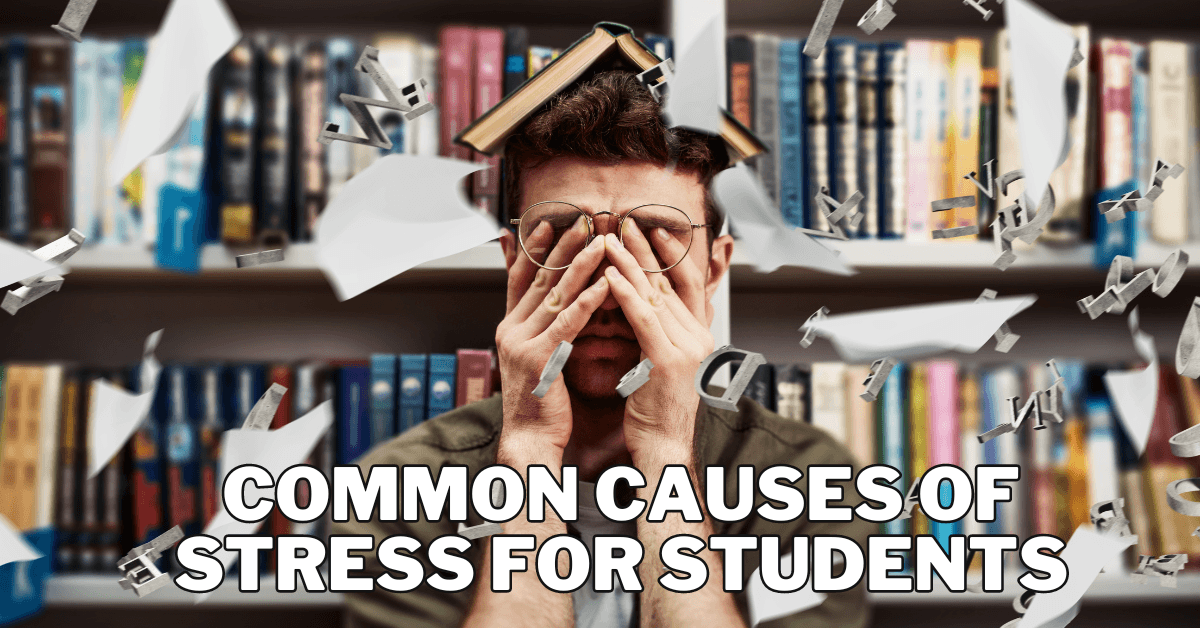Common Causes Of Stress For Students
Common Causes Of Stress For Students
For students, navigating the academic landscape is a life-changing experience but frequently involves difficulties and stress.
While designed to impart knowledge and foster personal development, the modern education system can inadvertently become a source of stress for many students.
From the demanding academic workload to the pressure of high expectations, students face a myriad of common stressors that impact their well-being and academic performance.
This article aims to illuminate common causes of stress for students across emotional, social, and academic dimensions by delving into the complex aspects of stress experienced by students, exploring the underlying causes, and offering insights into useful coping mechanisms.
Examining the emotional, social, and academic dimensions, we aim to illuminate students' challenges and provide valuable strategies for managing and mitigating stress.
By understanding these common stressors, students, educators, and parents can work collaboratively to create a supportive learning environment that nurtures academic success and the student's overall well-being.
The Effects Of Stress On Student Mental Health
The effects of stress on student mental health are profound and multifaceted, shaping the overall well-being of individuals undergoing the rigours of academic life.
Academic stress, stemming from heavy workloads, looming exams, and societal expectations, can trigger a cascade of emotional, cognitive, and behavioural consequences.
One prominent impact is the escalation of anxiety levels, manifesting as heightened worry, restlessness, and, in severe cases, panic attacks.
The pressure to excel academically can lead to persistent tension, affecting students' emotional stability.
Cognitively, stress often impairs concentration and memory retention, hindering effective learning and academic performance.
The overwhelming demands of coursework and examinations may contribute to a sense of cognitive overload, making it challenging for students to focus and retain information.
Additionally, the fear of failure and the pursuit of perfection can instigate negative thought patterns, further exacerbating mental strain.
Behaviourally, students experiencing stress may exhibit changes in their habits and routines. Sleep disturbances, changes in eating patterns, and social withdrawal are common indicators of stress-related issues.
Chronic stress can also play a role in the onset or aggravation of mental health disorders like anxiety or depression. Recognizing these intricate connections between academic stress and mental health is essential.
By implementing preventative measures—such as stress management classes, mental health support services, and encouraging open communication—we can all work together to make the school environment more sympathetic and understanding.
Addressing the effects of stress on students' mental health is pivotal for promoting holistic well-being and academic success.
Exploring The Common Causes Of Stress For Students
Students who successfully navigate the academic journey may find it rewarding and difficult, with various stressors frequently present.
Understanding students' common sources of stress is crucial to creating a supportive learning environment.
Academic pursuits can be both rewarding and challenging. The following are some common causes of stress for students:

1. Academic Pressure
Academic pressure is a formidable stressor for students, encompassing many challenges that shape their educational experience.
The weighty workload, a constant companion in academic life, demands meticulous time management and unwavering focus.
Often regarded as pivotal assessments, examinations add a layer of stress, requiring thorough preparation and performance under pressure.
The relentless pursuit of high grades while fostering a commitment to excellence introduces a complex dynamic where the fear of failure becomes palpable.
The looming spectre of self-imposed and external academic expectations can create an overwhelming sense of responsibility.
The quest for success and the desire to meet societal standards intensify the pressure, creating a mental burden that students carry throughout their educational journey.
In this high-stakes environment, the fine balance between ambition and the fear of falling short contributes significantly to the multifaceted landscape of academic pressure. This pervasive force shapes students' academic and emotional well-being.

2. Time Constraints
Time constraints pose a significant challenge for students navigating the intricate balance between academic responsibilities and extracurricular pursuits.
With many coursework, assignments, and extracurricular activities vying for their attention, students often grapple with the demands of time management.
The finite nature of time imposes strict limitations, leaving students feeling stretched thin as they attempt to fulfill various commitments within predetermined deadlines.
Balancing academic obligations with participation in extracurricular endeavours requires careful planning and prioritization, yet even the most meticulous scheduling may not suffice to alleviate the pressure.
Students may find themselves overwhelmed by the sheer volume of tasks and obligations, needing help to allocate sufficient time to each endeavour while maintaining a semblance of equilibrium.
The perpetual race against the clock fosters a sense of urgency and heightened stress as students endeavour to meet deadlines and fulfill expectations within limited time frames.
In this relentless pursuit of efficiency, managing time becomes an ever-present obstacle in the quest for academic success and personal fulfillment.

3. Social Expectations
Social expectations form a nuanced layer of stress for students as they navigate the intricate landscape of interpersonal relationships and societal norms within the academic realm. They are one of the common causes of stress for students.
Peer relationships, pivotal to the student experience, become a focal point where internal and external expectations converge.
The desire to fit in and be socially accepted adds a layer of complexity to the already demanding academic journey.
Negotiating social dynamics and maintaining friendships become intricate tasks, requiring emotional intelligence and adaptability.
The unspoken pressures of conforming to societal expectations and norms contribute significantly to the stress students experience in their educational endeavours.
Navigating social situations becomes a delicate dance, and students' minds are heavily weighted with the fear of judgment and the pursuit of social acceptance.
In this intricate interplay of social expectations, students grapple with academic challenges and the complicated dynamics of interpersonal relationships.
This creates a multifaceted experience where the social fabric contributes to the overall stressors inherent in the student journey.

4. Financial Concerns
Financial concerns overshadow the academic journey, constituting a pervasive stressor that significantly impacts students' mental well-being and academic performance.
The weight of tuition fees and the challenges of managing living expenses create a financial burden many students grapple with.
The spectre of student loans, often necessary to fund education, adds a layer of anxiety to the financial landscape.
Economic constraints permeate various facets of students' lives, from their daily necessities to long-term financial outlooks.
The pervasive nature of financial stress can lead to heightened levels of anxiety and emotional strain, diverting attention and mental energy away from academic pursuits.
The intricate dance of managing educational costs while striving for academic excellence becomes a delicate balancing act, where the fear of financial instability can cast a long shadow over the educational journey.
In navigating these financial challenges, students confront immediate fiscal pressures and grapple with the enduring impact on their mental well-being and the pursuit of their academic aspirations.

5. Future Uncertainty
The spectre of future uncertainty looms large in students' minds, constituting a formidable source of stress that permeates their academic journey, presenting one of the common causes for students.
The post-graduation landscape, career choices, and the ever-evolving job market contribute to a pervasive ambiguity about the future.
The pressure to make decisions that will profoundly shape their future creates a palpable tension for students as the weight of these choices reverberates through their academic pursuits.
The ambiguity surrounding post-graduation plans fosters a sense of unease, amplifying the inherent stress of academic responsibilities.
Often intertwined with personal identity and fulfillment, career aspirations become a focal point where students confront the uncertainty of their professional trajectories.
Navigating this terrain of unknowns requires resilience and adaptability, qualities that students may find challenging to cultivate amidst the prevailing uncertainty.
The fear of making the wrong choices or facing a competitive job market adds stress, influencing academic performance and the broader spectrum of students' lives as they grapple with the intricate puzzle of their future pathways.

6. Isolation And Loneliness
The emotional toll of isolation and loneliness becomes a poignant aspect of the student experience, particularly in new academic environments.
The feeling of being isolated, detached, or without a sense of belonging casts a heavy emotional burden on students.
The newness of academic settings and the challenge of forming meaningful connections contribute to a heightened sense of isolation.
The absence of robust social support networks intensifies the emotional toll, leaving students with profound loneliness. In this emotionally taxing landscape, the need for social connection and a sense of belonging becomes paramount.
The struggle to forge meaningful relationships, compounded by the pressures of academic life, creates a delicate balance where the lack of social bonds can significantly amplify stress levels.
Recognizing the importance of fostering connections and building a supportive community becomes crucial in mitigating the impact of isolation and loneliness on students' mental well-being, highlighting the intricate interplay between emotional fulfillment and the broader context of the academic journey.

7. Extracurricular Commitments
Although enriching, involvement in many extracurricular activities introduces unique challenges to student stress.
While these pursuits offer opportunities for personal growth and skill development, the delicate balance of juggling academic responsibilities alongside club memberships, sports, or other commitments can be inherently demanding.
The desire to excel academically and in extracurricular realms places students in a complex web of responsibilities where time management becomes paramount.
The challenge lies not only in participating actively in various activities but also in maintaining a high standard of academic achievement.
The inherent pressure to perform at a high level in both domains can lead to heightened stress as students navigate the intricate dance of fulfilling diverse commitments.
While extracurricular engagement adds depth to the student experience, it requires careful navigation of priorities and a conscientious approach to time and energy allocation, underscoring the multifaceted nature of common stress causes for students in the academic journey.

8. Adjustment To College Life
The adjustment to college life represents a significant juncture in the student journey, marked by myriad stressors from transitioning to a new environment.
For many students, adapting to the college milieu involves navigating unfamiliar terrain, making new friends, and grappling with newfound independence.
The prospect of forging connections in a sea of unfamiliar faces and managing the responsibilities that come with autonomy can be formidable sources of stress.
Homesickness, a prevalent emotional challenge, further compounds the adjustment process as students contend with the distance from familiar support systems.
The shift to a different lifestyle, often characterized by increased academic rigour and social dynamics, adds a layer of emotional complexity.
The delicate interplay between the excitement of newfound opportunities and the emotional challenges of adaptation underscores the multifaceted nature of stressors inherent in the transformative journey from high school to college.
Recognizing and addressing these adjustment-related stressors becomes integral to fostering a positive and resilient student experience during this pivotal phase of personal and academic growth.

9. Work-Life Balance
Striking a harmonious work-life balance becomes a paramount challenge for students engaged in part-time jobs or internships, introducing a unique set of stressors into their academic journey.
Pursuing financial stability or gaining practical experience through employment can sometimes clash with the demands of rigorous coursework, introducing a unique set of stressors into the academic journey and highlighting students' common causes of stress.
Managing work responsibilities alongside academic commitments requires meticulous time and energy allocation.
The inherent pressure to excel professionally and academically can lead to heightened stress as students navigate the intricate dance of dual responsibilities.
The challenge lies in meeting employers' expectations and maintaining a high standard of academic performance.
The juggling act becomes particularly demanding as students strive to fulfill professional obligations while ensuring their academic pursuits remain unaffected.
Acknowledging and addressing the intricacies of this work-life balancing act is crucial in supporting students who seek to gain valuable work experience while pursuing their educational goals, highlighting the nuanced interplay between academic and professional spheres in the student experience.

10. Personal Relationships
Navigating personal relationships can be emotionally exhausting for students because problems and disputes in this area can greatly affect their general well-being.
Whether grappling with issues in romantic partnerships, friendships, or familial dynamics, the intricacies of personal relationships can induce profound emotional distress.
The complexities of human interaction and the pressures of academic and extracurricular responsibilities create a delicate balancing act for students.
Relationship conflicts, including miscommunications, arguments, and even breakups, can increase stress and make it harder for students to concentrate on academics.
Furthermore, the emotional toll of strained relationships can permeate other aspects of students' lives, affecting their mood, motivation, and sense of self-worth.
Fostering healthy and supportive relationships is paramount to mitigating the negative effects of interpersonal conflicts on students' mental well-being.
Cultivating open communication, empathy, and conflict resolution skills can empower students to navigate the complexities of personal relationships more effectively, fostering resilience and emotional well-being amidst the challenges of academic life.

11. Lack Of Sleep
The importance of a healthy sleep routine cannot be overstated, as irregular sleep patterns, insufficient sleep, or difficulty maintaining a restful night's sleep can significantly contribute to stress among students.
The demanding nature of academic life, the pressures of meeting deadlines, and the management of various responsibilities often lead to irregular sleep patterns.
Insufficient or disrupted sleep affects both quantity and quality of rest, impacting cognitive functions and emotional resilience.
The toll on mental well-being becomes evident as students grapple with fatigue, decreased concentration, and heightened emotional reactivity.
The intricate relationship between sleep and stress underscores the need to prioritize adequate rest as an integral component of a student's overall well-being, emphasizing students' everyday stress causes.
Establishing and maintaining healthy sleep habits, including consistent sleep schedules and creating a conducive sleep environment, becomes essential in mitigating the adverse effects of sleep-related stressors.
Recognizing the interconnectedness of sleep, cognitive function, and emotional health is pivotal in fostering a resilient and thriving student experience.

12. Perfectionism
The pursuit of perfection, whether in academic or personal pursuits, can inadvertently become a significant source of stress for students.
Driven by an internalized desire for flawlessness, students who adhere to perfectionistic standards often impose immense self-induced pressure.
The relentless pursuit of meeting exceptionally high personal expectations can lead to a perpetual state of anxiety and fear of falling short.
This self-imposed pressure extends beyond academic performance to encompass various aspects of life, intensifying stress levels.
The quest for perfection demands an unattainable standard and fosters a mindset where any perceived deviation from this ideal becomes a source of distress.
Recognizing the potential pitfalls of perfectionism and cultivating a more balanced approach that acknowledges the inherent value of growth, resilience, and learning from imperfections becomes pivotal in alleviating the stressors associated with the relentless pursuit of an unattainable standard of perfection.
Encouraging a mindset that embraces progress over perfection can contribute to a healthier, more sustainable approach to academic and personal achievements.
Conclusion
In conclusion, understanding and addressing students' common causes of stress are paramount for creating supportive educational environments that prioritize mental well-being and foster resilience.
In the tapestry of student life, the common causes of stress weave a complex narrative that demands attention and understanding.
As we conclude this exploration, it becomes evident that a holistic and proactive approach is essential in supporting students' mental well-being.
Educational institutions are pivotal in fostering environments that prioritize mental health awareness, provide accessible resources, and nurture resilience.
By recognizing and addressing the common causes of stress, we acknowledge students' challenges and work towards creating a more empathetic and compassionate educational landscape.
Ultimately, we can cultivate an environment where students can flourish academically, emotionally, and personally through collaboration, understanding, and a shared commitment to student well-being.
I trust you enjoyed this article on the Top Causes Of Stress. Please stay tuned for more blog posts soon. Take care!
JeannetteZ
>>>Please click here to read my all-inclusive article about Lessons That Will Teach You All About Stress<<<
>>>Are you interested in Natural Healing And Stress Relief Through Herbs? Please click here for my #1 Recommendation<<<
Your Opinion Is Important To Me
Do you have thoughts, ideas, or questions? I would love to hear from you. Please leave me your questions, experiences, and remarks about this article on the Top Causes of Stress in the comments section below. You can also email me at Jeannette@Close-To-Nature.org.
Disclosure
This post may contain affiliate links. I earn from qualifying purchases as an Amazon Associate and other affiliate programs. Please read my full affiliate disclosure.
You might also enjoy these blog posts:
Tips For Making People Feel Comfortable Around You
Breadfruit Tree Growing Conditions
Easy Steps To Grow Euphorbia Flowers In Containers
Simple Steps Of Growing Cilantro In A Container








